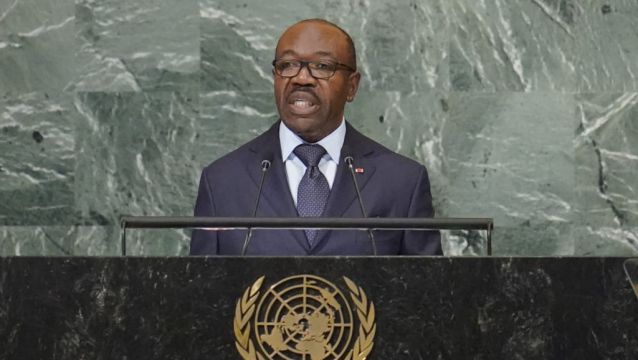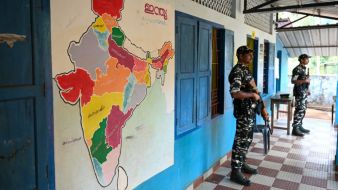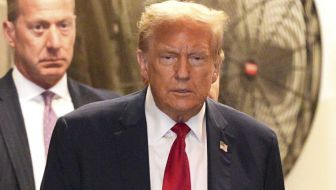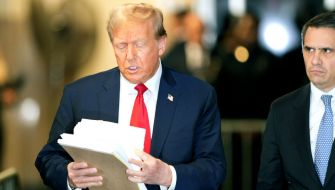The president of Gabon, Ali Bongo Ondimba, knew well the threat of military coups in his part of the world. But he swore one would not happen to him.
“While our continent has been shaken in recent weeks by violent crises, rest assured that I will never allow you and our country Gabon to be hostages to attempts at destabilisation. Never,” he declared this month as it marked 60 years of independence from France, almost all of that time with his family in power.
Now, according to a group of mutinous Gabonese security forces who spoke on state television early on Wednesday, he is under house arrest, accused of “unpredictable, irresponsible governance”.
The soldiers who claimed authority said people around Mr Bongo had been arrested for “high betrayal”, embezzlement and corruption, though it was not clear whether the president himself faced those charges.
“I don’t know what’s going on,” Mr Bongo said in a brief video shared with media outlets hours after the soldiers’ predawn announcement.
In the richly carpeted room where he sat, an image of former South African president Nelson Mandela sat on a bookshelf.
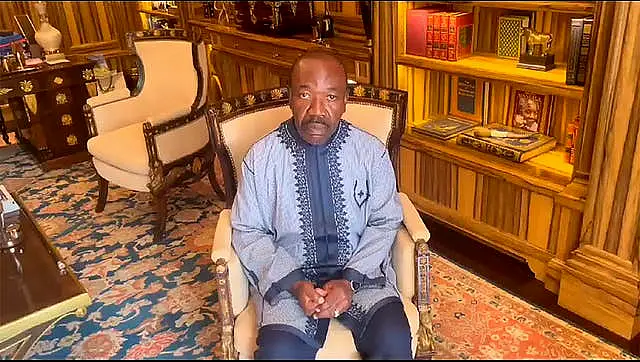
A longtime politician and one-time funk musician, the French-educated president, 64, is a member of one of Africa’s political dynasties.
He took office in 2009 after the death of his father, who ruled oil-rich Gabon for 41 years, and continued security partnerships with France and the United States.
His family’s longevity, perhaps, gave Mr Bongo confidence in the face of the military coups shaking other parts of French-speaking Africa.
Still, there have been challenges. He won his second seven-year term by a narrow margin in 2016 amid violent protests.
In late 2018 he had a stroke that kept him from his duties for months. Mutinous soldiers attempted a coup in early 2019 while he was in Morocco recuperating. They were quickly seized.
It is not yet clear how the coup announced on Wednesday, hours after Mr Bongo was declared the winner of a weekend presidential election, will play out.
The coup leaders said his family and his doctors were with him in his home. They did not give any details about his health.
Mr Bongo has held power in a corner of Africa where heads of state find ways to stay in office for decades.
Gabon’s neighbors are ruled by a trio of the continent’s longest-running leaders, including Teodoro Obiang in Equatorial Guinea, in office since 1979; Paul Biya in Cameroon, in office since 1982; and Denis Sassou Nguesso in the Republic of Congo, in office from 1979-92 and again since 1997.
While Gabon’s oil reserves have enriched its rulers, many linked by family ties, frustration has been growing among the population over the inequality on display.
“It is an oil emirate run like a family property for almost six decades,” said Thomas Borrel, an analyst in France who studies Africa.
Mr Bongo is one of Africa’s richest heads of state, and his wealth is likely to be scrutinised even more now, along with that of his family. Investigators in the US and France have looked into millions of assets in both countries.
For most people in Gabon, economic pain is rising along with prices. In an August 17 independence day speech, Mr Bongo acknowledged the widespread frustration.
“I know there is impatience,” he said, “the sentiment that we could have done better.”
He listed steps his government was taking to contain fuel prices, make education more affordable and to keep the cost of baguettes stable.
In January, the Gabonese government created a ministry to combat the high cost of living, according to the World Bank.
Even as he tried to appeal to citizens for votes, he continued what human rights groups and other observers have described as years of efforts to stifle the opposition.
Gabon abolished presidential term limits two decades ago. Last weekend’s general election, for the first time, was said to have no international observers.
Mr Bongo appeared intent on staying in office, like his father, until his death.
Affectionate about former coloniser France even as anti-French sentiment has grown in parts of Africa, Gabon’s president earlier this year played host to President Emmanuel Macron.
Mr Macron’s declaration there that “the age of Francafrique is well over” was a response to critics who have long asserted that Paris props up authoritarian rulers on the continent.
Now Mr Bongo, trapped at home, seeks help from “all the friends we have”.
In recent years he has tried to present Gabon to the world as a global leader in environmental conservation instead of a case study in clinging to power.
The United Nations last year described the small country as “probably the most carbon-positive country in the world due to its strong environmental conservation and longstanding political commitment to preserving the country’s untouched natural environment”.
In 2021, Gabon was the first country to receive payments for reducing forest emissions from deforestation. Mr Bongo took pleasure in the progress and praise.
But such achievements are now overshadowed by the sight of hundreds of people dancing and cheering in the streets of the capital on Wednesday, declaring themselves free.
